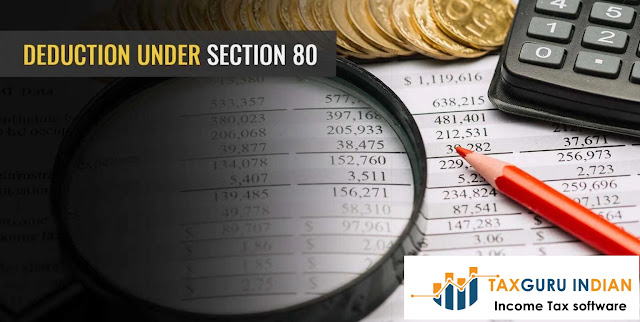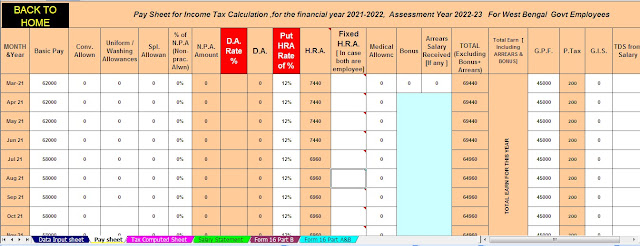Deduction U/s Section 80: Income tax exemption. It sounds a lot more complicated, but it doesn't have
to be. The government has offered many exemptions under various sections of the Income Tax Act
which you can take for your benefit. But to do that, you need to understand what multiple sections of
the Income Tax Act offers. One of these is section 80 of the Income-tax Act, 1961
The exemption U/s 80 includes so many options like deposited, premium payable, loan repayment etc. These options can significantly reduce your tax liability if you optimize them
If your annual income forces you to pay higher income tax, then it is time to consider section 80 But what exactly are they and how can one cut most of them under section 80? Read on to find out.
Income tax exemption under section 80C
Section 80C of the Income-tax Act offers a specific combination of Section 80C activities including CCC and 80CCD that taxpayers can use to reduce their taxable income. By investing your income in this activity, you can claim tax exemption up to Rs.1.5 Lakh when you file your income tax at the end of the financial year. Listed below are some of the most prominent investment options for claiming Section 80 deduction.
Feature of this Excel Utility:-
1) This Excel utility prepares and calculates your income tax as per the New Section 115 BAC (New and Old Tax Regime)
2) This Excel Utility has an option where you can choose your option as New or Old Tax Regime
3) This Excel Utility has a unique Salary Structure for Govt & Non-Govt Employee’s Salary Structure.
4) Automated Salary Arrears Relief Calculation U/s 89(1) with Form 10E for the F.Y.2021-22
5) Automated Income Tax Revised Form 16 Part A&B for the F.Y.2021-22
6) Automated Income Tax Revised Form 16 Part B for the F.Y.2021-22
7) Individual Salary Sheet
Tax Saving FD:
By investing in these, you will get the double benefit of tax deduction and a higher rate of return. For those who want to invest their money in low-risk instruments, tax saving FD is a perfect investment option.
PPF (Public Provident Fund):
PPF is the most popular option for many investors and taxpayers. As it is a government established savings scheme with a maximum term of 15 years, your money is not only secured but also guaranteed return. Interest earned on PPF is tax-free.
NSC (National Savings Certificate):
NSC is another option to choose from under the section 80 deduction. These schemes have a term of 5 years and a fixed rate of interest The interest you earn on your NSC investment falls within the deductible limit of Rs 1.5 lakh.
Life Insurance Premium:
If you have a life insurance policy, for yourself, your spouse or your children for whom you pay regular premiums, you can use this amount to claim a tax deduction.
Home loan repayment:
The premiums paid for the principal of your home loan are tax-deductible
Payment of tuition fee:
If you pay a certain amount of tuition fees for yourself, your spouse or your children, you can claim a tax deduction on that amount.
EPF (Employees Provident Fund):
As per the Employees Provident Fund Act, about 12% of an employee's salary is contributed to the Employees Provident Fund investment. The employee's deduction of this contribution is eligible for a tax deduction.
Section 80 CCC of the Income-tax Act proposes a deduction for contributions to the pension fund - if you invest in a pension plan paid for by public or private sector insurers, the premium you pay to this fund may be used to claim a deduction under section 80 CCC. . It falls within the maximum limit of Rs. 1.5 lakh
Section 80 CCD of the Income-tax Act proposes a deduction by the central government for contributions to the pension scheme - under this scheme, contributions made by both the employer and the individual are eligible for tax deduction up to 10% of the individual's salary.
Section 80D of income tax proposes deduction on premiums paid for medical insurance - you can claim up to Rs. 25,000 in any financial year. These policies can be for you, your spouse or your children. If one of the insured members is 60 years of age or older, deductible tax money may be claimed. 30,000 Additional tax deduction on medical insurance for parents is allowed Rs. 25,000. In the case, the parents are 60 years of age or older; You can claim up to money.
Section 80GG of the Income-tax Act gives exemption on rent paid. If HRA is not part of your salary, you can claim a deduction on the rent paid. However, you, your spouse or your children do not have to own a place of employment. The person claiming the deduction is the one living in the rent and paying the rent. The amount of discount under this section is limited. 60,000
Section 80 TTA of the Income-tax Act allows individual taxpayers and Hindu Undivided Family (HUF) to claim up to Rs. Savings within the country earn 10,000 interest per year on their investment in bank accounts.
Section 80U of the Income-tax Act allows a person with a disability to claim a tax deduction of up to Rs 75,000 per year. These individuals must have a certificate of disability (PwD) issued by a medical authority as evidence. In case of severe disability, you can claim a discount of up to ৷ 1.25 lakhs, subject to certain conditions laid down by the Government.
Feature of this Excel Utility:-
1) This Excel utility prepares and calculates your income tax as per the New Section 115 BAC (New and Old Tax Regime)
2) This Excel Utility has an option where you can choose your option as New or Old Tax Regime
3) This Excel Utility has a unique Salary Structure
5) Automated Income Tax Revised Form 16 Part A&B for the F.Y.2021-22
6) Automated Income Tax Revised Form 16 Part B for the F.Y.2021-22
7) Individual Salary Sheet






0 Comments